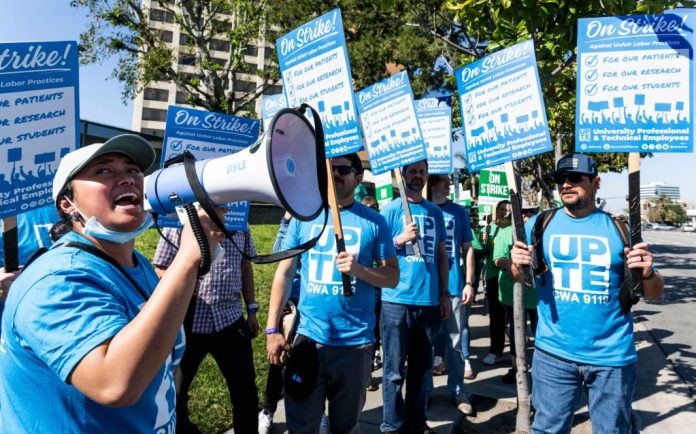In what would be considered the largest strike in the University of California’s history, more than 86,000 union nurses and healthcare professionals within its medical system announced plans Thursday to authorize a two-day strike Nov.17-18.
The contract expiration Oct. 31 for the unionized workers comes at a tough time for UC’s medical facilities, which have been dealing with the economic challenges of rising healthcare and tuition costs at its schools and “uncertainty about federal funding” and “unprecedented financial challenges,” according to the UC.
The three bargaining unions involved in the strike said the Oakland-based UC system has failed to “settle contracts addressing the cost of living and affordability crises” facing the university’s most “vulnerable workers.”
The American Federation of State, County and Municipal Employees Local 3299 represents 40,000 service and patient care technical workers at the UC, while the University Professional and Technical Employees-Communications Workers of America Local 9119 represents 21,000 healthcare, research and technical professionals, and California Nurses Association represents 25,000 nurses.
A UC statement issued Nov. 6 said the planned strike is “an attempt to pressure the university into accepting unreasonable wage and benefit demands that would put UC in a financially precarious position and jeopardize its mission of teaching, research and public service.” The university also said it is “disappointed that union leaders have chosen this path” after months of progress at the bargaining table.
“While these strikes may cause disruptions, UC will remain open,” according to the statement. “Our hospitals and clinics have contingency plans in place to ensure patients continue to receive safe, high-quality care, although some surgeries, treatments, and appointments may face delays.”
A top priority, the unions said, is to halt the UC management’s growing practice of short-staffing its facilities, and cutting back on resources.
The unions also allege the UC system is using “shadow beds” and long emergency room wait times as a result of management’s prioritization of more profitable elective surgeries. A so-called shadow bed happens when another bed is added to a room designed to have one patient. Nurses have raised concerns about patient privacy in these rooms, as well as the safety issues of navigating a room filled with medical equipment and limited space.
“During nearly two years of bargaining, UC has spent billions acquiring new facilities, lavishing exorbitant raises on its wealthiest executives and funding housing assistance programs to help these same ivory tower elites buy mansions or second homes — but it won’t offer its frontline workers enough to pay the rent or keep pace with the skyrocketing cost of groceries,” said Michael Avant, president of AFSCME Local 3299.
The UC labor talks are progressing on a different track than a separate one with Kaiser Permanente nurses and healthcare workers.
In the Kaiser labor talks, the United Nurses Associations of California / Union of Health Care Professionals recently ended its five-day strike without a labor agreement. The UNAC/UHCP, which represents more than 31,000 nurses and healthcare workers, is continuing talks with Kaiser to win economic gains in pay and benefits, as well as staffing.
If needed, the union expects to continue negotiations Nov. 12-14 at UNAC/UHCP headquarters in the City of Industry and Nov. 17-19 in Los Angeles.
As of Thursday, the union had not filed a 10-day notice to strike, according to Kaiser spokesman Terry Kanakri. “Talks are continuing,” he said.




